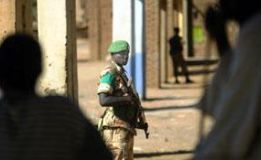Fresh violence in Darfur points up African Union’s limitations
By Sudarsan Raghavan, Knight Ridder Newspapers
TAWILLA, Sudan, Dec 2, 2004 (KRT) — The war in Sudan’s Darfur region is the kind of conflict the African Union was intended to resolve when its 53 member countries created it two years ago. Yet fighting here last week has revealed the group’s limitations.

|
|
Soldiers with the African Union Cease Fire Commission patrol the streets of Tawilla in northern Darfur, Sudan. (Detroit Free Press). |
A multinational peacekeeping force, drawn from among African Union members, is headquartered at El Fasher, 40 miles from Tawilla. Another 200 African Union troops are based at Kebkabiya, no more than 30 minutes away by helicopter.
But no peacekeeping troops were dispatched when fighting broke out in Tawilla between black African rebels and the Arab militia known as the Janjaweed. The first African Union troops came to Tawilla on Saturday, five days after the fighting, on a fact-finding mission. They stayed one night.
“We’re not authorized to intervene to stop the fighting,” said Jean Baptiste Natama, the African Union’s senior political officer. “What happened in Tawilla is because we don’t have the mandate.”
On paper, the African Union has the power to intervene in the nations that belong to it – most in Africa do – in cases of genocide, war crimes or gross human-rights violations. Darfur is the African Union’s first real test as to whether it can act on this power.
“If we succeed, it means that the international community will take us seriously. They’ll say at last the Africans can solve their own problems,” Natama said. “If we fail, we’ll take a long time to recover our credibility.”
On the plus side, the African Union sent troops to Sudan when no Western nation or group of nations would. It’s opened a dialogue between the rebels and government in Darfur. It’s brokered prisoners’ release and eased access to war-afflicted areas.
It may have saved men’s lives. On Monday, the government released 11 prisoners it alleged were rebels into the African Union’s custody in El Fasher. The men, who said they were workers returning from Libya, not rebels, had been held for six days and beaten with rubber tubes and camel whips. Two showed recent scars that crisscrossed their backs.
“We would still be beaten and humiliated if the AU wasn’t here,” said one of the men, Tinal Mahmoud, 44.
Yet the force is struggling to end the 22-month-old war, which many observers worry is pushing Darfur toward anarchy. Despite the presence of AU peacekeepers and a cease-fire agreement, both sides continue to attack. The violence is choking the flow of humanitarian aid, endangering an already fragile and frightened population.
One of the problems is the force’s size. There are only 800 soldiers to cover a region the size of France and not enough military vehicles or helicopters. The force is expected to grow to 3,320 by February, but even then it will be woefully small. For comparison, 15,000 U.N. peacekeepers patrol the much smaller, once equally chaotic, country of Liberia in West Africa.
“It depends on what mission you want to perform,” said Col. George Davoine, the vice chairman of the African Union force. “If it’s peacekeeping or peace enforcement, it’s not enough.”
Sudan’s government is adamant about not wanting more peacekeepers. But the African Union, in theory, has the power to override concerns of national sovereignty.
“If the situation continues we have no choice but to change the mandate,” Natama said. “If we don’t change it, we have to pack our bags and go home.
“We have to be able to bring peace – or impose peace,” he said.
That’s what the citizens of Tawilla hope for. Last week’s violence followed months of tensions between black African civilians and the Janjaweed. It was sparked by an uprising two weeks ago by local merchants that left four Arabs dead. That triggered a spree of revenge looting and shootings by the Janjaweed.
The rebels then attacked the police station. The government responded by bombing the town to flush out the rebels. Tens of thousands fled the fighting.
“The African Union did nothing,” said Muhammed Sharif, a Tawilla resident. “So we fled. Up to now, our women and children are in hiding. I am so upset.”
Saturday, the arrival of the AU convoy drew many from their hiding places in the hills.
“If the AU is here we’ll stay the night,” said Amoora Hassan, 22, who sat in her hut on the other side of town. “If the AU is not here, we will not stay.”
Many shared similar sentiments with Lt. Col Ahmed Fouad of Egypt, the lead investigator, who was protected by Rwandan soldiers in green berets as he spoke to town leaders.
He promised his team would stay. Later, he confided that he hadn’t had the heart to tell them it would be for only one night.
The next day, as the convoy drove out of Tawilla, the AU force handed out military rations to smiling women, but Malhassan Yusuf, 25, felt a familiar fear.
“Now we are worried. The AU is not here,” she said, holding her 3-year-old girl, Masajit. “We’re afraid this town will be attacked by anybody.”
She looked for a second at Masajit, then added:
“God only knows what will happen to us in the future.”
